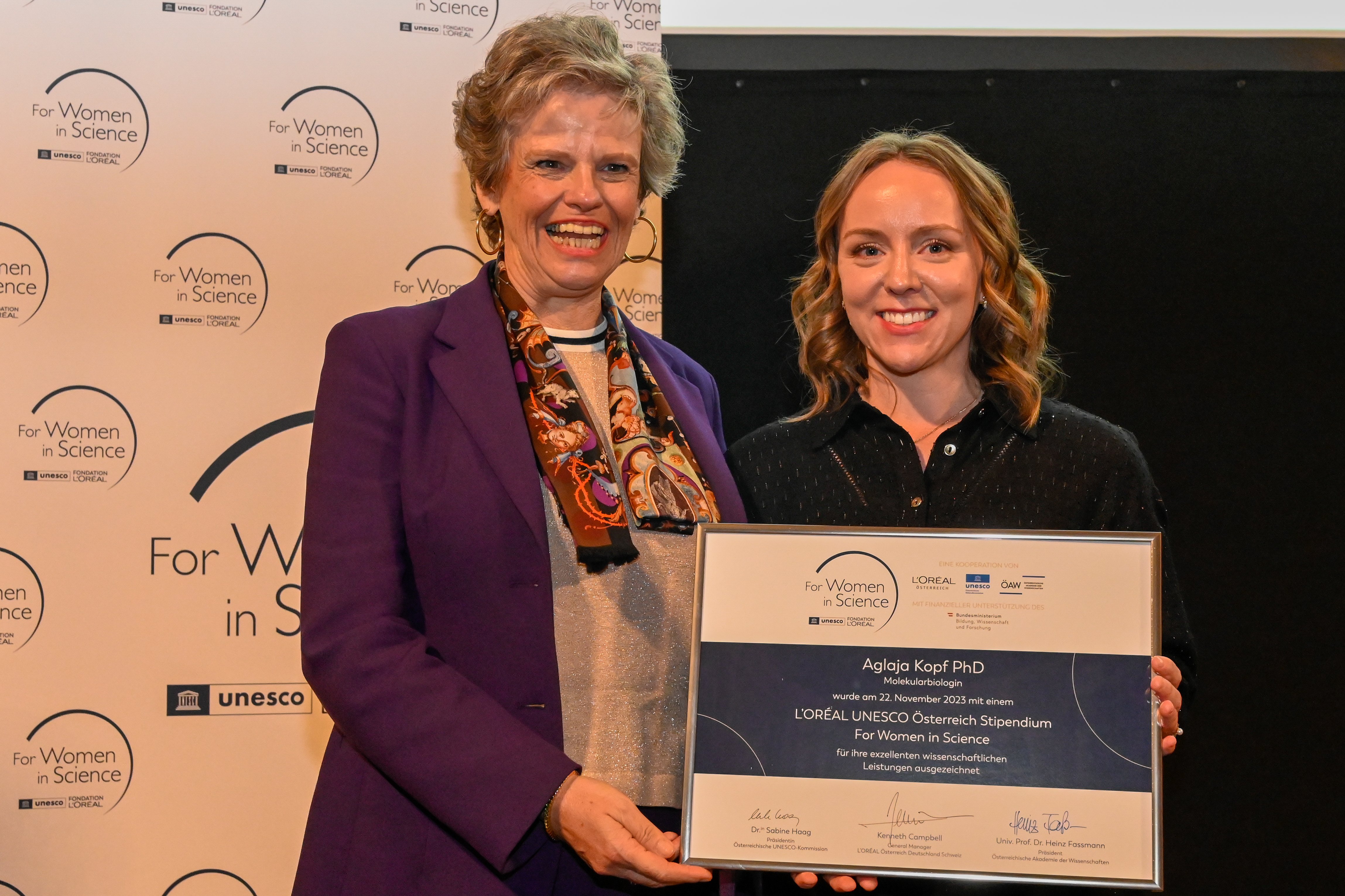
(Vienna, 23 November 2023) Aglaja Kopf, molecular biologist at MedUni Vienna's Department of Dermatology, has been awarded a L'Oréal-UNESCO Austria FOR WOMEN IN SCIENCE scholarship. The scholarship was awarded at a ceremony at the Austrian Academy of Sciences.
Aglaja Kopf receives the grant for her project "Cell InterActions in Granulomas".
Granulomatous diseases affect millions of people worldwide, including children, and usually take a chronic course with a high socio-economic burden.
Granulomas are evolutionarily ancient structures and are thought to have evolved as a protective mechanism to eliminate or encapsulate harmful material. Granulomatous inflammation is a particular form of chronic inflammation whose main feature is the presence of compact cell aggregates, especially macrophages and T cells, surrounded by concentric scar tissue deposited by mesenchymal structural cells. Tissue scarring is a pathological feature of many granulomatous diseases and is the main risk for organ transplantation, as targeted therapy is not possible and organ function is lost.
There is increasing evidence for a major mesenchymal link in inflammation, immunity and cancer, revealing the functional diversity of structural cells. However, specifically the role of non-hematopoietic cells in the pathogenesis of granulomatous diseases is poorly understood due to the lack of (i) reliable granuloma models and (ii) knowledge of cell interaction networks in granulomas.
Therefore, Aglaja Kopf investigates the role of granuloma-associated fibroblasts (GAFs) in the pathogenesis of granulomatous diseases by combining unbiased system-wide analyses with human tissue bioengineering and state-of-the-art microscopy. Specifically, the three-dimensional reconstruction of granuloma spheroids with human patient-derived material allows for targeted analysis of cell-cell interactions at the molecular level.
The expected benefits of this work include a more coherent understanding of how basic cell biological functions translate into clinically relevant disorders. As the researcher aims to understand a fundamental feature of a nearly ubiquitous cell type, the implications of these findings will be important for biological processes ranging from development and regeneration to immunology and cancer biology.
In particular, the results of this research will directly contribute to a better understanding of the biological basis of granulomatous diseases and potentially reveal new candidates for therapeutic approaches.
About the person
Aglaja Kopf studied Molecular Biology and Molecular Medicine at the University of Vienna and completed her PhD studies in Cell Biology/Immunology at IST Austria. She is currently working as a postdoc at the CeMM Research Center for Molecular Medicine of the Austrian Academy of Sciences in the research group of Georg Stary.
Scholarships support female researchers at the beginning of their career or when (re-) starting out
L'ORÉAL Austria, in collaboration with the Austrian UNESCO Commission, in cooperation with the Austrian Academy of Sciences and with financial support from the Federal Ministry of Education, Science and Research, awards scholarships for female scientists in medicine, natural sciences or mathematics.
The scholarships are intended to support female researchers at the beginning of their scientific career or when (re-)entering a scientific career. Anna Bychek (University of Innsbruck), Federica Caforio (University of Graz) and Charlotte Zajc (University of Natural Resources and Life Sciences, Vienna) were also honored on this day.
FOR WOMEN IN SCIENCE was launched in 1998 in partnership with UNESCO to empower more women scientists to overcome barriers to advancement and help solve the great challenges of our time. In 25 years, the For Women in Science program has supported more than 4100 women researchers from over 110 countries, rewarding scientific excellence and inspiring younger generations of women to pursue careers in science.